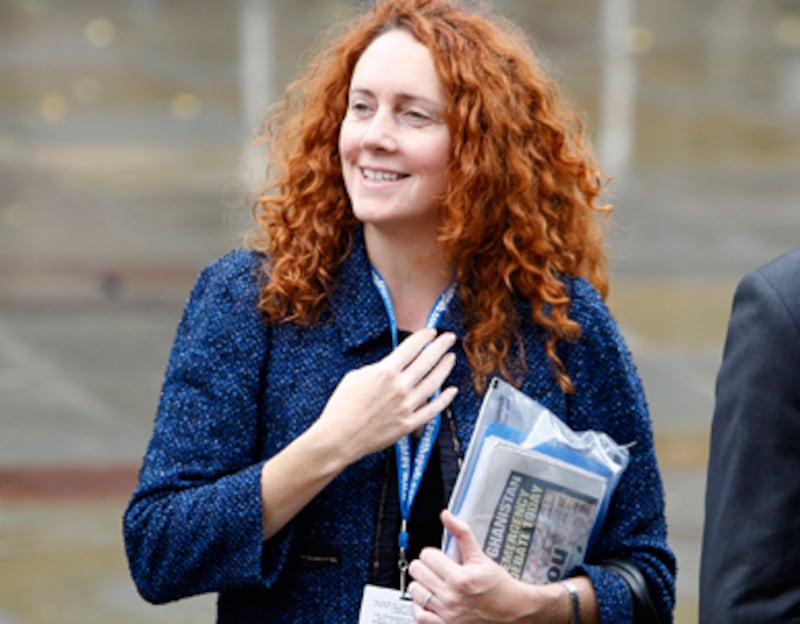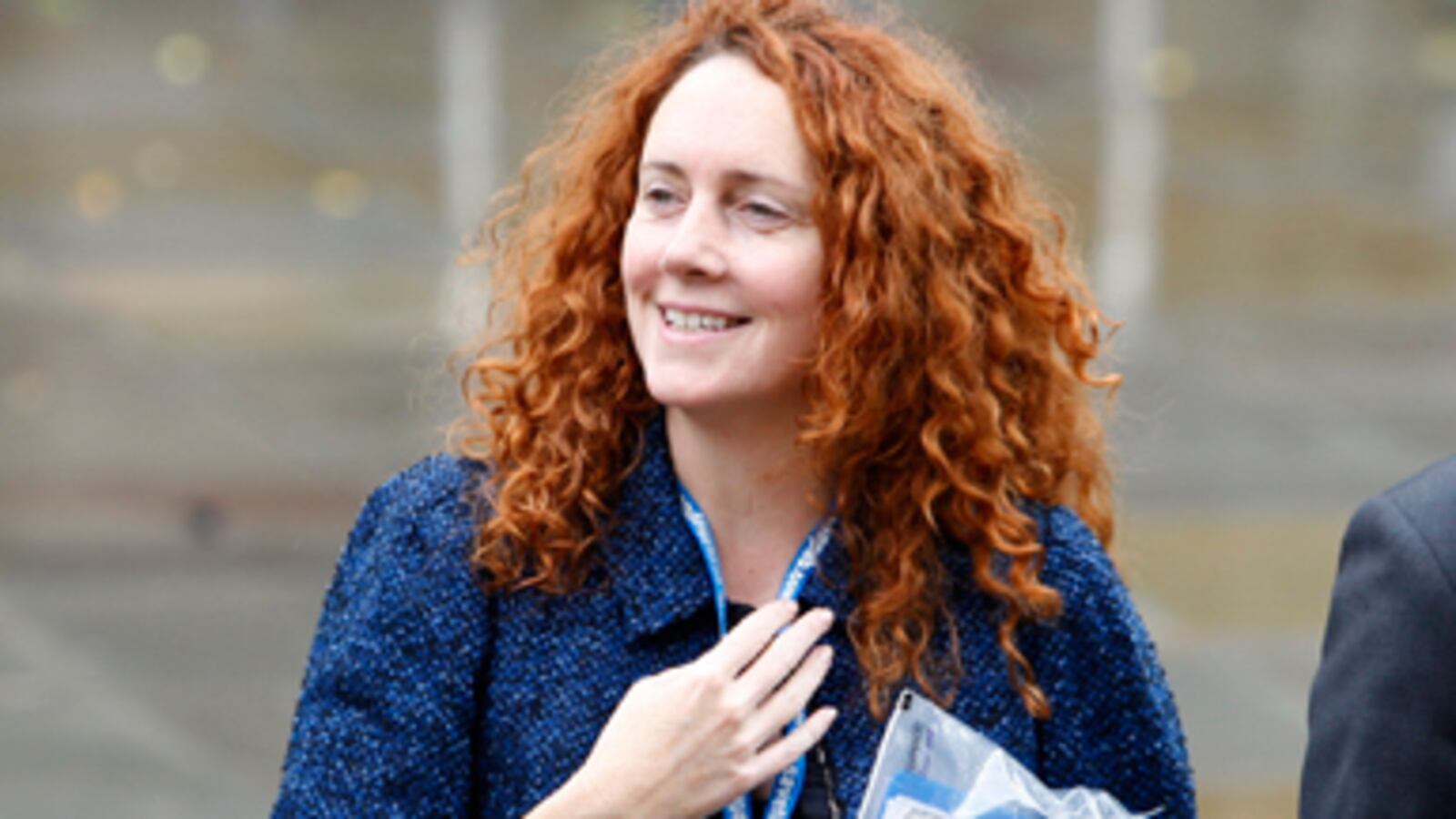For the scandal-hungry British tabloids, it was the perfect domestic storm. A television star with a tough-guy reputation scraps with his glamorous and high-profile wife when she returns from work after a few drinks. The husband suffers a cut lip, police are called, and the wife spends a night in the cells.
But one editor wasn't gloating when the story broke back in 2005. The wife in question was Rebekah Brooks (née Wade), then boss of The Sun, the bestselling tabloid in Britain; the husband was actor Ross Kemp. Not that Brooks appeared too ruffled. According to one media account, she arrived at work the next day, coolly asking whether much had happened. Her colleagues applauded.

It's an episode that neatly demonstrates the qualities that took Brooks to the top of the brutish male-dominated world of British tabloid journalism: toughness, dedication to her work, and a lively temper that matches her Titian-red hair. These days, the 42 year old is CEO of Rupert Murdoch's News International, responsible for a stable of papers that includes The Sun and the News of the World, as well as The Times and The Sunday Times.
They are also qualities that Brooks may need badly today. For the last five years Murdoch's British operations have been struggling to cope with the ever-widening fallout from revelations that a private investigator working for the News of the World, infamous for probing the private lives of public figures, hacked into royal cellphones. The freelancer has since served a gaol term, and so too has the paper's royal correspondent.
But the scandal isn't going away. A long list of politicians, models, and sports stars are claiming that their own phones were tapped. News International has been forced to drop its former insistence that the hacking was the work of a few rogue elements, amid suggestions that the practice was commonplace in other Murdoch newsrooms, possibly with the connivance of senior figures.
"She was amazingly bold and fearless," says writer Ginny Dougary. "It's hard to imagine her being corporatized, but I suppose she'd have to be."
Already the affair has claimed one casualty close to the heart of the political establishment. Earlier this year Prime Minister David Cameron's director of communications, Andy Coulson, who was editor of the News of the World when the hacking took place, stepped down from his job. Coulson insists that he was unaware of any illegal surveillance ops, but the unceasing media interest had made his Downing Street role impossible. Coulson's pleas of ignorance were further weakened Friday with the murder acquittal Friday of Jonathan Rees. The acquittal, The Guardian reports, means Rees can now be named in the News of the World case; he was rehired by Coulson after serving several years in jail for planting drugs on a woman to discredit her during a divorce.
Brooks herself is not immune from awkward media speculation. "I find it rather difficult to believe that illegal practices widespread while Mr. Coulson was editor… were completely unknown to Mrs. Brooks," media commentator Stephen Glover writes in The Independent, no friend to the Murdochs.
So far, Brooks has largely stayed out of the limelight. Never keen on giving interviews, she's repeatedly refused to testify before the parliamentary committee investigating the hacking allegations. The committee has not forced the issue, a decision one member has ascribed to fear of the Murdoch tabs. An aggressive quizzing might have led to some ruthless exploration of the members' private lives.
Brooks' rise has been swift. A spell at the Sorbonne in Paris was followed by an apprenticeship on local newspapers and a place as a researcher on the News of the World. Talent spotted early, she was in the editor's chair by age 31, switching three years later, in 2003, to The Sun. In 2009, she moved out of the day-to-day news business and into the upper ranks of the Murdoch corporate hierarchy.
Apart from her abilities as a journalist, she can clearly trade on powerful charm and a striking personality. "When I first set eyes on her, I thought she was the most fantastic creature I had ever seen, and it got even better when she spoke," says writer Dougary, who first met Brooks at a meeting of Women in Journalism, a campaigning organization where Brooks was a founding member. "She was amazingly bold and fearless. It's hard to imagine her being corporatized, but I suppose she'd have to be."
Certainly, her social talents have brought her friends from across the political spectrum. Among the guests at the party to mark her second marriage, in 2009, to racehorse trainer Charlie Brooks, were then Prime Minister Gordon Brown, as well as his Tory opponent, David Cameron. Inevitably, such ties are politically fraught. Media commentators have pounced on her decision to entertain Cameron and James Murdoch, son of Rupert and News Corporation's Europe and Asia chairman, to dinner at her Oxfordshire home when the Murdochs were seeking to buy a controlling stake in broadcaster BSkyB, a move open to government challenge on antitrust grounds.
For the Murdoch family, her position as an intimate and valued lieutenant looks assured. The boss' children James and Elisabeth are said to be friends as well as business associates. "She's very much a trouble shooter for Rupert, whether in business circles or political circles or managing people within the company," Phil Hall, her previous boss and mentor at the News of the World, once told an interviewer, "She's not afraid to roll up her sleeves. Too many people take the ‘safety first' approach and are scared to put their head above the parapet, but she's not like that."
With the mutual affection goes loyalty. Before last year's election, Brooks reportedly accompanied James Murdoch on an announced visit to the office of the chief executive of The Independent, Simon Kelner, to deliver an invective-laden complaint about one of the paper's advertisements. ("Murdoch won't decide this election, you will.") That's a typically bold gesture when hostile rivals are waiting to land a blow on Murdoch—or his lieutenants.






